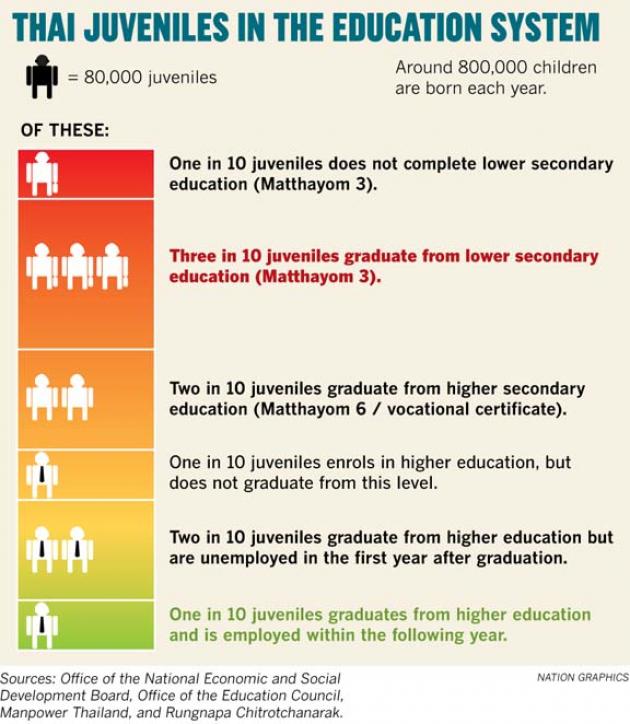Seminar spells out education system's inadequacies

The education system is failing in properly equipping juveniles to join the job market, as six out of 10 only complete at most a higher secondary or vocational education, a seminar heard.
“The workforce is mostly not well educated and not productive,” said Krissanapong Kirtikara, second vice chairman of the Quality Learning Foundation.
Stakeholders at the foundation’s seminar urged the Education Ministry to prepare youngsters with practical occupational skills.
Professor Pavich Tongroach, adviser to the education minister and chairman of a basic-curriculum and textbook reform panel, said he would take the seminar’s recommendations on needed skills back to his panel’s meeting to discuss changes to the curriculum so that the majority of students, who were not in higher education, would have enough work and life skills.
He has a meeting with Prime Minister Yingluck Shinawatra tomorrow to talk about shaping the education strategy and says he will report to her the progress on the curriculum revamp. Also, the panel members will this week gather with the Institute for the Promotion of Teaching Science and Technology to work out suitable changes in science and mathematics courses, he said.
The panel will from April 20-21 review the recommendations from various agencies and hold a public hearing to brainstorm suitable proposals.
Thailand is now a greying society, Krissanapong said. Only a fifth of the population is younger than 15. The elderly will increase in number and proportion and become an economic and social burden on society.
“Thailand is ageing before getting rich because of an uneducated and less productive workforce,” he said.
“The education system needs to be reformed to ensure work competency and good work habits, which are workability and employability and value orientation. This should lead to employment,” he said.
In a recent survey of 317 teachers from various kinds of schools, 42-64 per cent said study hours were too long, more than 50 per cent said the hours for compulsory subjects should be decreased by four or five hours per week to give more time to electives, and 89-99 per cent proposed that lectures be decreased by four hours per week to allow time for learning by doing.
The seminar proposed putting practical occupational skills and life skills needed for today’s world in the curriculum that is being now revised.
The participants also called for a change to the class schedule so that students would take core and required subjects in the morning and learn skills for occupations and living in the afternoon. The occupations should match the demand of the surrounding communities.
Two student representatives at the seminar, Thanayut Singhaseni, 20, from Stamford International University and Weerayut Kongnhu, 19, from Rajaprajanugroh School 42, came up with ideas, such as the improvement of cognitive skills, a greater emphasis on public consciousness, civic duty and various skills to be applied in real life, and learning English from native speakers.
